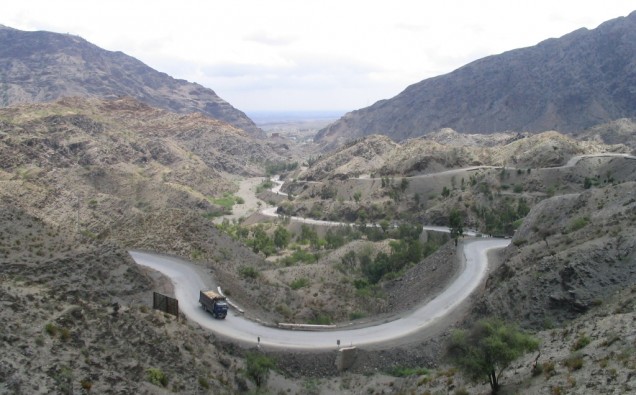
Khyber Pass connecting Pakistan and Afghanistan, Photo by James Mollison (James Mollison) Wikimedia Commons
Pakistan’s military has launched a new countrywide operation to target terrorists in the wake of a sudden resurgence in bombings that shocked the nation last week with over 100 killed.
The new campaign named ‘Operation Radd-ul-Fasaad’ (elimination of the evil perpetrators) comes after the PML (N) Government said it has empowered the military to go after terrorists.
“The operation aims at indiscriminately eliminating residual or latent threat of terrorism, consolidating gains of operations made thus far and further ensuring the security of Pakistan’s borders,” a statement released Wednesday to the media said.
Also on Wednesday, the United States said it would continue to support Pakistan’s fight against terror and that the American military in Afghanistan has been working with the Afghan security forces to dismantle hideouts which Pakistan says were used for bombings in Pakistan this week.
According to the statement issued by the Inter-Services Public Relations (ISPR) , the media wing of armed forces, Pakistan Air Force, Pakistan Navy, Civil Armed Forces (CAF) and other security and law enforcing agencies (LEAs) will continue to actively participate and intimately support the efforts to eliminate the menace of terrorism from the country.
The operation will complement Islamabad’s beefed up counterterrorism drive along the Afghan border.
Meanwhile, in Punjab, the largest province with Lahore hometown of Prime Minister Nawaz Sharif, the Government has agreed to seek assistance of paramilitary forces to target terrorists after last week’s deadly bombing outside the provincial assembly in Lahore.
Another bombing last week on a Sufi shrine in Sehwan, Sindh, killed more than 80 devotees, who were performing a spiritual ecstatic dance known as “Dhamal.”
A countrywide “de-weaponisation and explosive control are additional cardinals of the effort. Pursuance of National Action Plan will be the hallmark of this operation,” the statement said of the latest campaign.
Earlier, Army Chief Qamar Javed Bajwa had a meeting with Punjab corps commanders, Pakistan Rangers (Punjab) DG, and the heads of intelligence agencies in Lahore on Wednesday.
Jamaat-ul-Ahrar, a splinter group of the Tahreek e Taliban Pakistan, a banned terror group that has been fighting the Pakistani state for around a decade, claimed responsibility for the attacks.
Islamabad has apprehended a number of suspects and traved bombings to Afghanistan, where the TTP and Jamaat ul Ahrarn terrorists are known to have established sanctuaries after Pakistan’s earlier operation Zarb e Azb in the tribal areas.
A number of militants crossed Pakistan-Afghanistan border and found a refuge in Afghanistan. Kabul, which is faltering in its own fight against the Afghan Taliban, has been asked to hand over the militants.
At the same time, Pakistan has stepped up action against terrorist hiding along the Afghan border including those on the Afghan side. After a tense week on the border, which involved closure of key crossings used by the Afghans and refugee families, Pakistan has agreed to work cooperatively with Afghanistan.
On Tuesday, terrorists, which Police said were Uzbek nationals, killed another eight people in Charsadda city in Khyber Pakhtunkhawa province, which borders tribal areas.
Pakistan’s earlier operation Zarb e Azb was deemed a big success, and according to the Global terrorism index (GTI) 2015, Pakistan remained the only country in the ten most terror afflicted countries where terror incidents and killings dropped significantly.
But the recent wave of bombings has also given rise to accusations that India is fueling terrorism in Pakistan from the Afghan soil. New Delhi has long been opposing China Pakistan Economic Corridor, and this week Islamabad said it is aware of Indian designs to upset Pakistan’s economic progress – acknowledged by leading world organizations. Meanwhile, Pakistan-Afghanistan relations have also taken a hit after the deadly attacks in Pakistan. For its part, Kabul complains that Pakistan has not acted strongly against Afghan Taliban sanctuaries that militants including the Haqqani group use against Afghanistan.
Islamabad is also weary of Afghans being able to move across the border under the guise of refugees. Pakistan still hosts around two million Afghan refugees, and has asked them to cooperate with Pakistani officials in identifying terror suspects.
In recent days, Pakistan has also moved against militants including Hafiz Saeed of Jamaat ud Dawa to put him under house arrest and reportedly cancel his weapons licenses.
Yet, Pakistan’s national action plan to defeat the extremist mindset remains in limbo, and experts say reforms must go hand in hand with military actions to root out extremism, which takes the form of terrorism.













